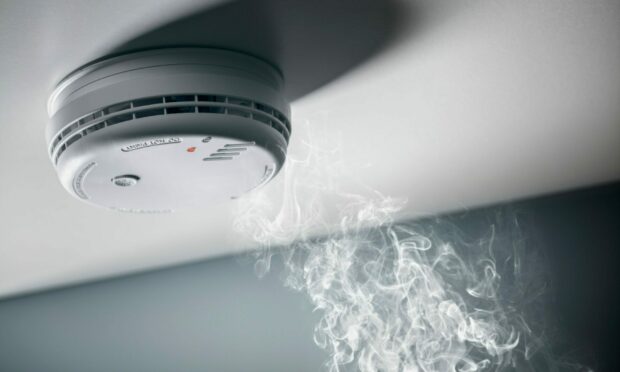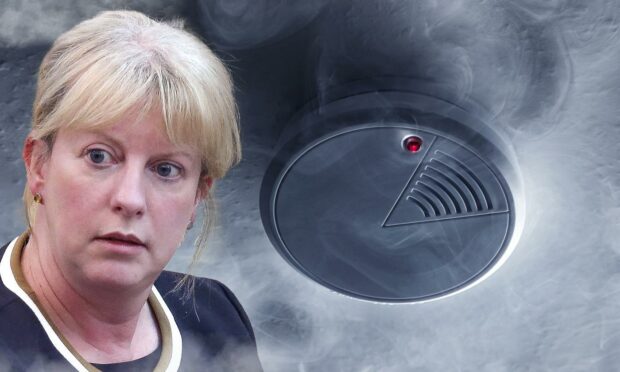Six councils across the north-east, Highlands and islands have yet to fully comply with new fire safety legislation, blaming access problems and some tenants refusing to keep appointments.
The legislation, which came into force on February 1 last year, requires all households in Scotland to have the appliances installed in their homes.
It is the responsibility of councils to ensure the alarms are installed for their tenants.
The Scottish Government rejected calls last year to extend the February deadline for all households in the country to have new interlinked smoke detectors installed.
Just a quarter of Scottish councils fully comply with the new legislation almost 12 months on, according to figures obtained by the Scottish Conservatives.
More than 1,000 council homes across Aberdeen are still to be fitted with interlinked smoke alarms out of a total of 22,500 rented properties.
Elsewhere, the figures show:
- There are round 438 homes owned by Highland Council which do not fully comply.
- 336 council properties are not upgraded across the Shetland Islands.
- There are 162 to complete in the Orkney Islands,
- Moray is still to upgrade 59 properties.
- Aberdeenshire has 11 homes to upgrade.
Data released under freedom of information legislation revealed only eight Scottish local authorities currently meet the regulations for council homes.
‘Challenges’ across northern Scotland
Western Isles Council has fitted new interlinked alarms in all its council homes and completed its final property by August 30 last year.
A spokesman for Aberdeenshire Council say staff have visited all 13,000 plus properties it manages and are now “almost 100% compliant”.
He added: “We do have a very small number where access has proved challenging, but this is reducing as our teams work together with the tenants to address any issues.”
A Moray Council spokeswoman said the local authority is now 99% compliant and expects to have the final 59 properties completed by the end of March.
As of December 7, Orkney Islands Council had installed the alarms in 83% of its properties, with 786 of 948 homes completed.
The local authority said the remaining 162 homes are either located in “remote or off the Orkney mainland locations” or where contractors have “failed to gain access despite multiple visits and attempts to contact the tenants”.
The council is currently implementing plans to make all its council homes compliant and aim to have these completed “as soon as possible”.
In Shetland, council officials said the remaining properties are ones where “mainly there has been problems gaining access”.
Highland Council has completed the work in 97% of its 14,600 council-owned houses.
The data, from November, shows the council has yet to install the appliances in over 400 homes across the council area.
A spokeswoman for the council said: “The roll out has been successful with only a small number of partially-compliant properties in which the council are working to obtain entry to complete works.”
Argyll and Bute Council transferred its social housing stock to Argyll Community Housing Association over a decade ago.
The local authority retains a small number of domestic premises which are compliant with the regulations.
‘Inept forward planning’
Miles Briggs, housing spokesman for the Scottish Conservatives, condemned the SNP’s “systemic underfunding” of councils and “inept forward-planning” for these failings.
This is despite most the councils blaming delays to compliance on issues gaining access to the remaining properties.
He said: “The fact that the vast majority of councils have buildings that still don’t comply with the Scottish government’s fire alarm law – almost a year on from it coming into force – is deeply alarming.
“This was a vital piece of fire-safety legislation but its implementation by SNP ministers has been shambolic and incompetent from day one.”
‘Vital piece of safety legislation’
A Scottish Government spokeswoman said: “We do not have access to the data this claim is based on and it is not clear whether, for example, empty properties are included in the figure.
“However, this is a vital piece of fire safety legislation which is why it was not delayed.
“Interlinked fire alarms play a key part in improving fire safety within the home and we continue to encourage everyone to install the alarms as they can protect lives and property.
“The legislation required people to have the alarms installed by February 2022, but it provides flexibility on meeting the standard recognising individual circumstances.”


